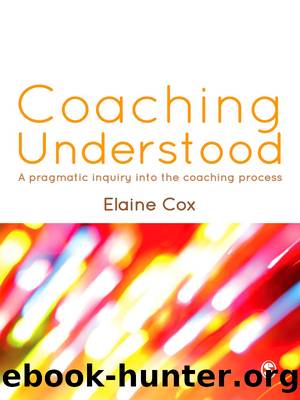Coaching Understood: A Pragmatic Inquiry into the Coaching Process by Elaine Cox

Author:Elaine Cox [Cox, Elaine]
Language: eng
Format: azw3
ISBN: 9781446290972
Publisher: SAGE Publications
Published: 2012-11-11T16:00:00+00:00
When we become critical thinkers we develop an awareness of the assumptions under which we, and others, think and act. We learn to pay attention to the context in which our actions and ideas are generated. We become sceptical of quick-fix solutions, of single answers to problems and of claims to universal truth. We also become open to alternative ways of looking at, and behaving in, the world. (1987: ix)
Thus critical thinking impacts our lives in many ways. In relationships we are more tolerant as we begin to see ourselves through the eyes of others. At work we can take control and initiate new projects. Politically, as Brookfield also suggests, ‘we value freedom, we practice democracy, we encourage a tolerance of diversity and we hold in check the demagogic tendencies of politicians’ (1987: ix). He places critical thinking ‘at the heart of what it means to be a developed person living in a democratic society’ (1987: 14). For Brookfield, ‘being a critical thinker involves more than cognitive activities such as logical reasoning or scrutinising arguments for assertions unsupported by empirical evidence’ (1987: 13). It is in this way that we scrutinise our own assumptions and beliefs, as well as other aspects of life. We can then justify our choices because we have looked at alternatives.
Brookfield further points out that the various phrases used to describe critical thinking, such as critical analysis, critical awareness, critical consciousness and critical reflection are often vague, and he describes how the concept has been interpreted differently in different contexts. In philosophy and education it is seen as synonymous with developing logical reasoning ability. In psychology, criticality focuses more on manipulating thought processes, such as beliefs or values, or enhancing metacognitive understanding. Brookfield refers to these different interpretations of critical thinking as ‘traditions’. It is worth exploring these in more detail.
Analytic – In the first tradition, according to Brookfield, critical thinking follows the work of Argyris (1982), with its use of lateral, divergent thinking strategies and double loop learning methods. Executives, for example, are said to learn critically when they examine assumptions that govern their business decisions by ‘checking whether or not these decisions are grounded in an accurately assessed view of market realities’ (Brookfield, 2005: 11). This tradition has its basis in analytic philosophy and logic. Traces can be seen in the work of Argyris, and other business or research models where accuracy of evidence and subsequent analysis is sovereign, and there is no requirement to question assumptions. This tradition works on the basis that critical thinking must be sensitive to the context, reliant on criteria, and be self-correcting (i.e. reflexive).
When coaches are recommended to become critical via reflective practice, it is often within this analytic frame of reference. As a coach developer based in Higher Education, the critical thinking I expect from student coaches in their essays and written papers requires an internal coherence between the evidence they present and the conclusions they draw. Similarly, a director of an organisation needs to examine the evidence underpinning decisions made.
Download
This site does not store any files on its server. We only index and link to content provided by other sites. Please contact the content providers to delete copyright contents if any and email us, we'll remove relevant links or contents immediately.
The Art of Coaching Workbook by Elena Aguilar(50044)
Trainspotting by Irvine Welsh(20948)
Twilight of the Idols With the Antichrist and Ecce Homo by Friedrich Nietzsche(18268)
Fangirl by Rainbow Rowell(8760)
Periodization Training for Sports by Tudor Bompa(7891)
Change Your Questions, Change Your Life by Marilee Adams(7324)
This Is How You Lose Her by Junot Diaz(6403)
Asking the Right Questions: A Guide to Critical Thinking by M. Neil Browne & Stuart M. Keeley(5322)
Grit by Angela Duckworth(5265)
Red Sparrow by Jason Matthews(5169)
Paper Towns by Green John(4756)
Room 212 by Kate Stewart(4706)
Ken Follett - World without end by Ken Follett(4413)
The Sports Rules Book by Human Kinetics(4048)
Housekeeping by Marilynne Robinson(4018)
Double Down (Diary of a Wimpy Kid Book 11) by Jeff Kinney(3878)
Papillon (English) by Henri Charrière(3873)
Exercise Technique Manual for Resistance Training by National Strength & Conditioning Association(3757)
The Motorcycle Diaries by Ernesto Che Guevara(3756)
